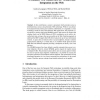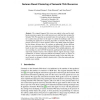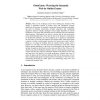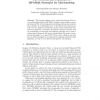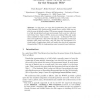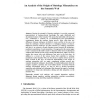120
Voted
ESWS
2008
Springer
15 years 4 months ago
2008
Springer
Future information, knowledge and content infrastructures which provide highly automated support in fulfilling users goals will most likely rely on some form of GRID computing. In ...
138
Voted
ESWS
2008
Springer
15 years 4 months ago
2008
Springer
In this contribution a system is presented, which provides access to distributed data sources using Semantic Web technology. While it was primarily designed for data sharing and sc...
132
Voted
ESWS
2008
Springer
15 years 4 months ago
2008
Springer
Abstract. The original Semantic Web vision was explicit in the need for intelligent autonomous agents that would represent users and help them navigate the Semantic Web. We argue t...
132
Voted
ESWS
2008
Springer
15 years 4 months ago
2008
Springer
Most of the challenges faced when building the Semantic Web require a substantial amount of human labor and intelligence. Despite significant advancement in ontology learning and h...
132
Voted
ESWS
2008
Springer
15 years 4 months ago
2008
Springer
Abstract. This research explores a new method for Semantic Web service matchmaking based on iSPARQL strategies, which enables to query the Semantic Web with techniques from traditi...
90
Voted
ESWS
2008
Springer
15 years 4 months ago
2008
Springer
In this paper, we argue that implementing the grand vision of the Semantic Web would greatly benefit from a service which can enable the reuse of globally unique URIs across semant...
130
Voted
EKAW
2008
Springer
15 years 4 months ago
2008
Springer
Despite the potential of domain ontologies to provide consensual representations of domain-relevant knowledge, the open, distributed and decentralized nature of the Semantic Web me...
128
click to vote
EKAW
2008
Springer
15 years 4 months ago
2008
Springer
With the advent of the Web and the efforts towards a Semantic Web the nature of knowledge engineering has changed drastically. In this position paper we propose four principles fo...
139
click to vote
EKAW
2008
Springer
15 years 4 months ago
2008
Springer
Semantic Web applications tests show that their usability is seriously compromised. This motivates the exploration of alternative interaction paradigms, different from the "tr...
150
Voted
EKAW
2008
Springer
15 years 4 months ago
2008
Springer
A promising application domain for Semantic Web technology is the annotation of products and services offerings on the Web so that consumers and enterprises can search for suitable...

